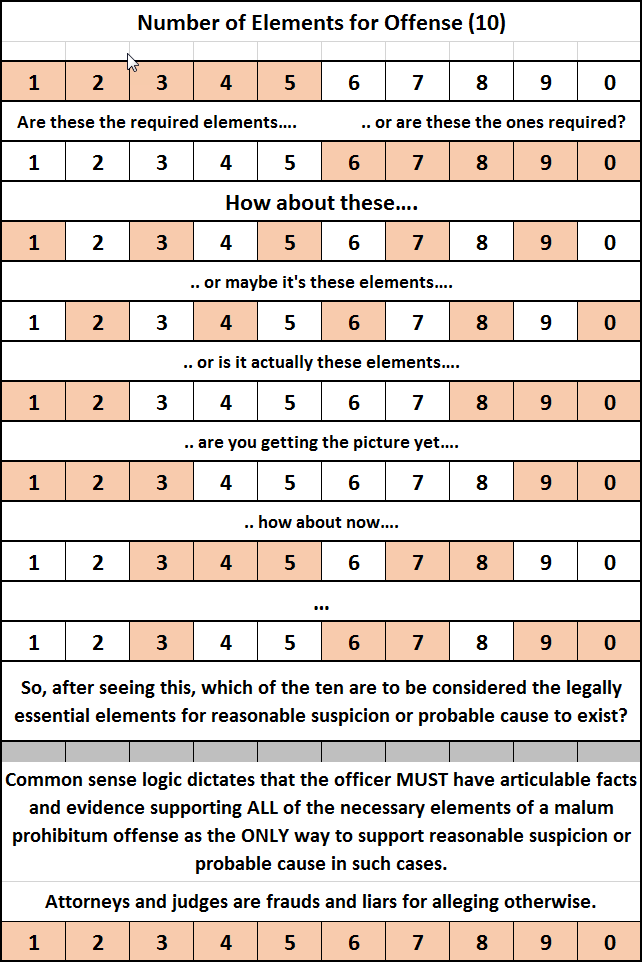How is it reasonably possible for any law enforcement officer or other law enforcement personnel to reach articulable facts supporting reasonable suspicion or probable cause in a malum prohibitum offense situation?
An officer cannot be expected, or believed, to be capable of articulating reasonable suspicion or probable cause without actually knowing ALL of the required elements of such an offense, can they? How could they be reasonably said to be capable of doing so without first knowing such essential information relative to a charged offense? I would offer the proposition that it is actually completely impossible for it to be obtained at all in the vast majority of such situations.
For instance; since virtually ALL “traffic” stops are malum prohibitum, just exactly WHICH of the multiple required elements of any of the subject matter related malum prohibitum offenses are legally considered to be THE specific necessary elements that are absolutely ESSENTIAL in providing the officer with the required reasonable suspicion or probable cause? Is the officer required to state these elements as part of their official report on and before levying the charge in the first place so as to prima facially validate the warrantless seizure, search, and arrest of the individual being accused? Is an officer required to immediately inform the Accused of these specific elements in order to lawfully and legally establish the officer’s legal authority to act against them in this matter?
Let us say, for instance, that a particular malum prohibitum offense has ten (10) evidentiary elements that MUST be stated in the criminal complaint and charging instrument and then proven in a court of law in order to constitute a valid charge and to get a conviction for the offense. Keep in mind that, in a criminal matter, ALL of the elements of an offense must be properly alleged in the complaint and charging instrument and then proven with admissible facts and evidence at the evidentiary phase of any trial. NONE of the evidentiary elements are allowed to be simply presumed, as this is a violation of the right of due process.
Consider that the presumption of any element of an offense to be automatically true is a presumption of an individual’s guilt upon that element, and violates the individual’s right to be presumed innocent of ALL of the elements of the alleged offense, which would then leave the STATE with the requirement to prove only those elements for which no presumption of guilt currently exists. Therefore, if ANY presumption of guilt for ANY element of an offense were actually constitutional and allowable in our justice system, then it would be a simple step for our law enforcement agencies and judicial system, and their related processes and procedures, to begin to operate entirely upon the presumption that they are ALL true and that the accused is actually guilty without need of a trial, and,therefore, would no longer be required to be presumed innocent of the allegation by default. Right?
Now then, we need to figure out just which specific evidentiary element(s) of those 10, and how many, are to be considered enough to give the officer reasonable suspicion or probable cause to suspect and believe that this particular offense actually had been, was being, or is about to be committed. Does the officer require the ratio of only five (5) out of the full 10, or does s/he need only six (6) or seven (7) of the 10 instead? How about just one (1) of the 10? Perhaps a percentage would be better, so, is the percentage of required elements 1%, 5%, 10%, 51%, 60%, 75%, or 90%?
Furthermore, not only do we need to establish just how many of the total 10 elements are needed, but just exactly WHICH elements of the 10 does the officer actually have to possess facts and evidence in support of the allegation(s) versus how many and which elements does the officer simply get a free pass to presume to be absolutely true without supporting substantive facts and evidence? Just where and with which elements do we draw the line as to how to fully establish reasonable suspicion or probable cause?

If there is supposed to be an automatic presumption of innocence of every element of an offense in our system of justice, then exactly how and by what pretense is this presumed any less true when it comes to the presumption of innocence of every element of a malum prohibitum offense in the eyes of law enforcement? Are they actually free to simply accuse any and all of us, the People, of crimes and criminal activity, without any actual accountability, thus endangering our individual health and welfare by making such unsubstantiated presumptions and conclusions?
Let’s just make it easy for them. How about we allow articulable facts and evidence of just one (1) out of the 10 elements of the offense? Let’s say, for the sake of argument, that the only essential required element is that the accused individual was in their car at the time of the alleged offense. That way, the officer need only allege that the accused individual was “in a vehicle,” and that none of the remaining elements of the 10 is then actually required to provide reasonable suspicion or probable cause to believe that the individual perpetrated the offense. Now no other facts and evidence is necessary to provide the officer with the requisite reasonable suspicion or probable cause to suspect criminal conduct. Now the officer can justifiably kill you because s/he had reasonable suspicion or probable cause to believe that you are a criminal simply because you were “in a vehicle” and that you somehow refused to comply with some arbitrary and rights-violating ‘order’ in an entirely officer-perceived-and-subjective timely and efficient manner. That would make perfect sense and should work out okay for the accused individual more often than not, right?
So, let’s consider these aspects and then ask ourselves this question again; just HOW MANY of the evidentiary elements are actually required and WHICH ONES out of the full 10 in our example are considered the necessary elements versus the unnecessary elements that are legally required to provide the officer with articulable facts supporting the reasonable suspicion or probable cause necessary to exercise any warrantless arrest authority and to use force, all the way up to deadly force, in order to facilitate that arrest?
After all, unless ALL of the required evidentiary elements are there, then, legally speaking, there is no offense, and no lawful charge, prosecution, or conviction, is legally possible or justified. So, just exactly WHICH of the 10 would allow the officer to properly and legally make the allegation, even though the prosecutor could never legally and lawfully PROVE the offense in court?
This is precisely the problem with ANY malum prohibitum offense, the lack of articulable facts and evidence to fully support reasonable suspicion or probable cause that ALL of the required statutory elements of the offense exist. The major difference between malum prohibitum and malum in se offenses being that, in a REAL crime, there is the potential to prove an actual injury to some specific person, their rights, or their property, as the result of intent or negligence. The complaint by some party that they are the victim of an actual provable injury caused by the accused individual, in and of itself, is entirely sufficient to provide the required reasonable suspicion or probable cause to believe that at least some sort of criminal activity has more than likely occurred. However, in a malum prohibitum allegation, there is no complaining party that can provide actual evidence that they sustained any provable injury in order to provide that level of reasonableness.
Therefore, we can reasonably conclude that, where no articulable facts and evidence can prove a complaint of palpable injury to persons or property, virtually all malum prohibitum offenses and sanctions are completely unconstitutional on their face, and are a denial of our individual right of due process and to be free from unreasonable searches and seizures ab initio because they afford the means for easy abuse by law enforcement officers and the STATE while providing no reliable and non-subjective manner in which to reasonably provide articulable facts supporting reasonable suspicion or probable cause so as to fully protect the individual rights of an accused individual.


